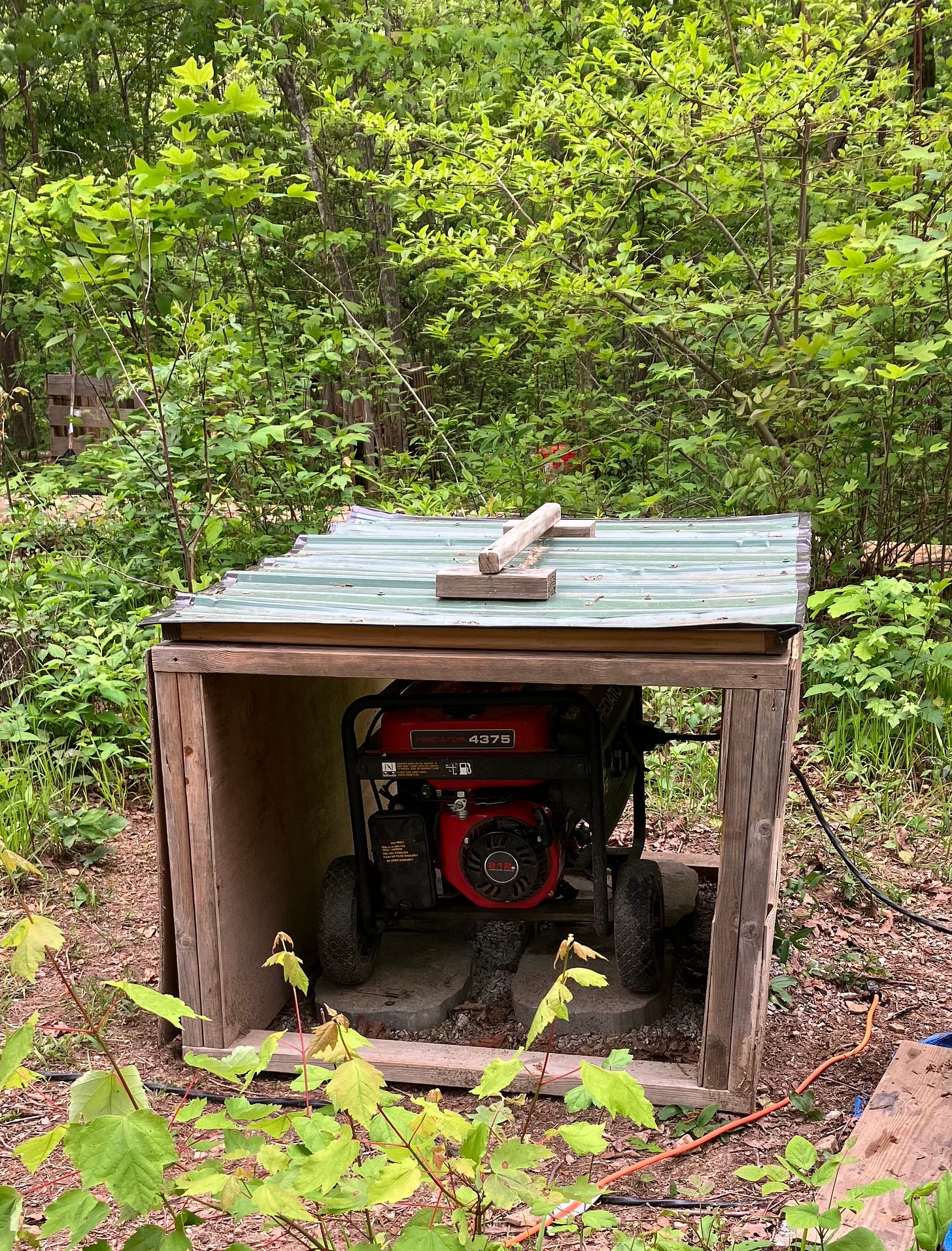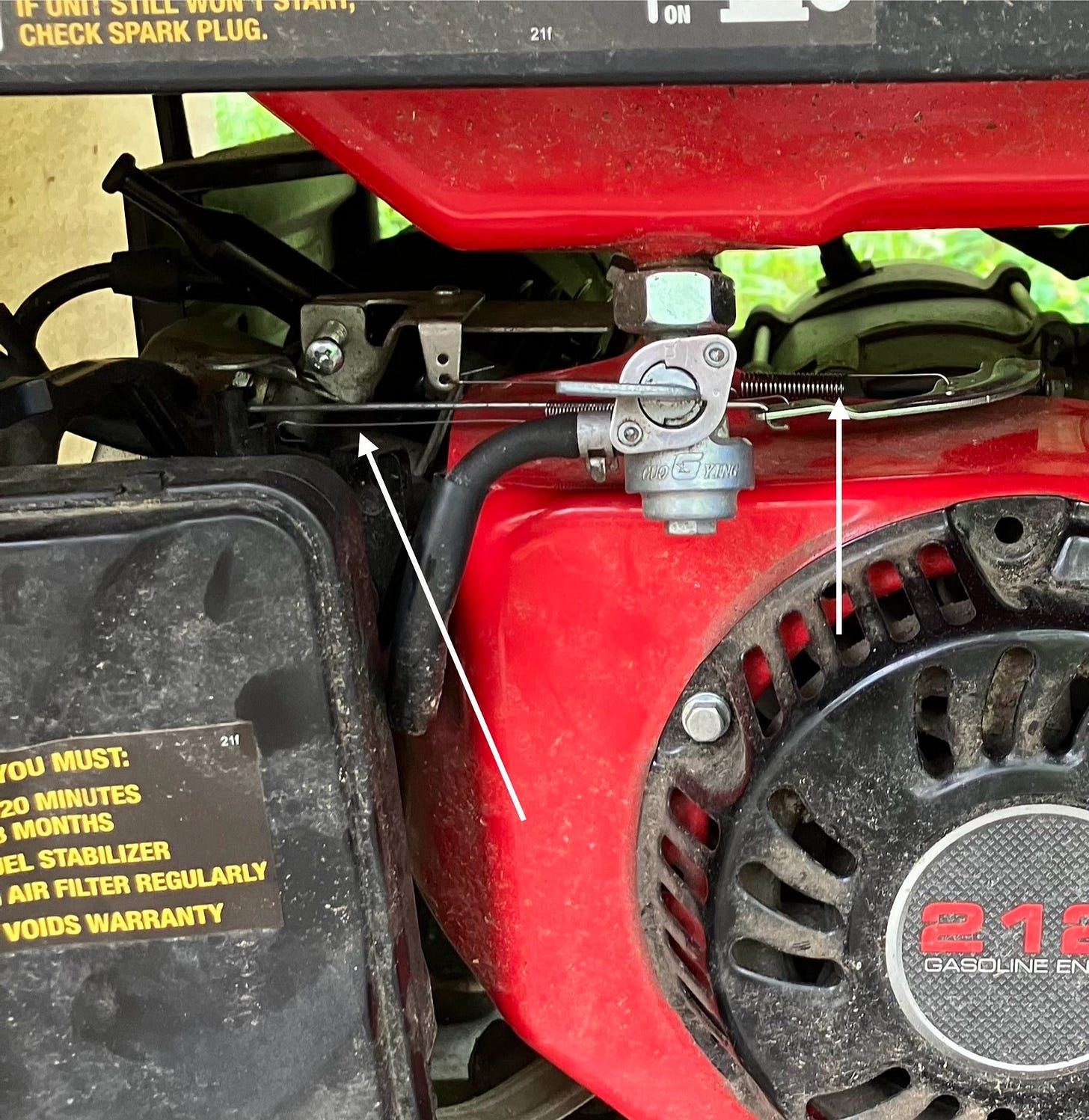Moon Day Thoughts
Enjoying the art of generator maintenance - a journey from fear to competence
Happy Moon Day. The moon is full in Scorpio today. Time for some focused introspection and for getting in touch with what you really desire in your life.

Thursday night, I got done with my work shift (building a patio and sidewalk at the main house), took the dog for a walk down to the garden, and then came back up to the cabin to make dinner.
I went out back and turned on Fred, our 4375-watt gas-powered generator, as I usually do. Went back to the circuit breaker in the bedroom and turned it on. Unplugged the mini-fridge from the solar power circuit and plugged it into the house circuit. And turned on some lights.
Everything seemed fairly normal, at least in the zone of quasi-acceptable, for the first little while. But by the time we’d finished eating dinner the lights were flickering eerily like a scene from a suspense thriller. A visual cue from the director that something bad is about to happen to our innocent protagonist.
I had just been reflecting on how well Fred has been running so far this year. And now — something was obviously wrong.
I experienced a familiar sinking feeling. Whatever I had on my to-do list for Friday was going to have to take a back seat to me fixing the generator. Fred gives us lights at night and powers the fridge, but he also charges up the chest freezer in the shed where we keep the dog’s food and bones and our frozen meat and veg, plus things like extra butter and cheese that don’t fit in the mini-fridge.
On Fred’s being generator number 5 (give or take a couple)
We inherited a giant old 9000-watt Honda Black Max generator when we moved out here in November 2023. It was crushing loud. Like living next to an airplane hangar. The previous owner told me it probably needed a tune-up and suggested I take it to the Mennonite small engine repair guy.
Which I did. He told me he could have it back to me in time for our move-in date. But when I drove over to get it from him, he hadn’t even touched it. We were able to borrow another Black Max (christened Fat Jeff) from my boss on the farm. Fat Jeff ran great for a few days and then he quit working.
So we loaded Jeff up on the pickup truck and took him to the small engine guy, who had by now supposedly repaired Big Jim, the original Black Max.
Big Jim ran through the month of December and then he needed work again. So we swapped him out for Fat Jeff. He ran fine for one night and then started surging wildly.
At this point I was done with the Mennonite guy, who had a shitty attitude and didn’t really seem to be doing anything other than maybe spraying some carb cleaner and adjusting the timing a little bit.
He hadn’t bothered to fix the obviously-broken choke lever, so that every time I started the generator I had to reach up under the frame around the carburetor and manually hold the choke mechanism while pulling the starter cord and then, once the engine was running, I had to jam a little twig in under the lever to hold it in the “run” position.
So, a cold, dark December night I went out with a flashlight and somehow figured out that the throttle return spring had broken off and that was what was causing the engine to throttle up and down wildly. I managed to tie the spring to the throttle assembly in a way that the generator would run smoothly at about three-quarters power (which was plenty for our modest power needs).
But I didn’t grow up learning how to work on cars or repair engines. I think my stepdad had some mechanical know-how because I remember him working on things around the house — like the time I went out to see him installing a CB radio in the Green Hornet and he had sliced into his artery with his Marine Corps Ka-Bar knife and blood was shooting out of his thigh and he told me calmly to “go get your mother” — but he never had the patience (or maybe the confidence?) to teach me anything about fixing stuff.
We had spent all of our savings moving to the farm and were pretty broke that winter. But we desperately needed a generator we could depend on, so — after some research — we decided to spend our last $500 on a Harbor Freight Predator 4375. It was much smaller and lighter than the Hondas and we calculated that the 3500 running watts were more than enough for our power needs. Plus, it was the smallest gas-powered generator on the market equipped with the L14-30R transfer switch-ready 240-volt outlet we needed to be able to plug into the existing electrical system in the cabin.
We named this generator Fred (rhymes with Pred) and Fred was awesome! Super quiet compared to the Hondas. Ran like a top. Life was good.
But after almost exactly 30 days, Fred started surging wildly and then wouldn’t start anymore. Luckily, he was still under warranty. So I drained the gas tank and fuel lines and carburetor and took him back to the Harbor Freight store in McMinnville and traded him in for a new version, Fred 2.
Fred 2 ran like a champ until about a month after his warranty expired. The night Fred 2 died was a sad night, indeed. I hooked Fat Jeff (or Big Jim — we eventually lost track of who was who) back up to the house system, remembered where to jam the twig and how to tie off the throttle spring. But he was so loud! We had also gotten used to spending a couple hundred dollars a month on gas with the Freds, as opposed to the $600/month it cost to run either of the Black Maxes for a few hours a night.
The beginning of a journey to competence
I called Harbor Freight tech support. I started searching internet forums and watching YouTube videos. It seemed that Fred 2’s problem had something to do with the carburetor. I eventually diagnosed it as a stuck float needle. So I took the carburetor apart and cleaned it and tried to reseat the float needle, as per the YouTube instructions.
But the float needle wouldn’t seat. I would later realize that a tiny metal piece had broken off the needle but all I could figure out at the time was that there was no way I was going to be able to get the float needle to stay where it needed to be in order to float.
(I did try just putting it as close to where it belonged as possible and reattaching the carburetor to the generator. To my surprise, Fred 2 started right up! Then I noticed it felt like it was raining on my right arm and the side of my face. Weird, because it was a sunny day. That’s when I glanced over to see a small but vigorous fountain of gasoline spraying up into the air from the top of the carburetor. “THAT’S NOT GOOD,” I announced loudly. Fortunately I was able to shut Fred off without any serious damage being done to me or the shed or the forest.)
** By the way, over the course of this journey, Fred 2 assumed a place of honor in our lives and became just Fred, so that’s how I shall refer to him moving forward. **
I was looking for a replacement float needle assembly online when I realized I could just buy an entire replacement carburetor for $20 on Amazon. Well, what do you know. I bought a new carburetor and put it on and then — at some point in my 35th re-reading of the paperback manual that came with the generator — I noticed that the Predator line is backed by a federally-mandated warranty on any components covered by EPA compliance regulations. The warranty was very strongly worded and stated that Harbor Freight would replace the specified parts or the generator at no cost to me even after the original warranty had expired.
After the gas-spraying-while-engine-running incident, it seemed like it would be safer to just replace Fred again rather than gamble on my suspect engine repair skills. I’d already installed the replacement carburetor but I decided to take a day and remove the new carb, reinstall the old broken one, drain the gas tank again, remove the wheel kit, load Fred into the van, and drive to McMinnville to get a new generator.
All of which I promptly proceeded to do. Except get a new generator. The manager at Harbor Freight, who looks like a fairly nice robot approximation of a human being, looked at me like I had two heads when I told him what I was doing.
“We can’t do that here,” he explained to me in a loud monotone. Kind of like an American tourist trying to explain something obvious in English to a French person. “We don’t repair anything in the store here. You have to call this number and they’ll make an appointment to come to your house and fix it.”
I was crushed,
Then I got mad. Not at the robot store manager. He was obviously unequipped to help me and perhaps even a little scared that I would appear in his store with this absurd expectation.
I just decided I was going to fix Fred myself. And if I couldn’t, we could buy a new one (we were in a somewhat less-dire financial position by now) or find another brand. Whatever — I wasn’t going to wait a week or two for some technician to try to find us out in the woods and maybe the generator would get fixed and maybe it wouldn’t.
So I drove back home and reinstalled the Amazon carburetor, realizing in the process that I had forgotten on my first attempt to replace one of the two little gaskets that fits in between the carburetor and the engine block.
This time I put it all together and — wonder of wonders — it worked! I was so proud. And relieved. Very relieved.
The replacement carburetor lasted about three months and then it went bad. So I just ordered a replacement for the replacement, installed it and carefully reconnected everything. And Fred ran great for the last nine months (except during the coldest days of the winter, when I figured out I could drain the old fuel out of the carburetor by hand and that would get him going again).
On having beaten one’s head against the wall long enough that things swim in to focus
Or worked hard enough, long enough, on something outside your comfort zone that you actually develop confidence in your ability to deal.
In the early (and middle) parts of my generator maintenance journey, I would go into a fight-or-flight trance when the lights started flickering wildly or I heard the generator engine surging. I didn’t know what I was doing. I didn’t really understand the parts I was trying to work with. And if I didn’t get it fixed, it could lead to a long chain of unfortunate circumstances.
I felt a little tinge of that on Thursday night, mainly because I had just changed the oil a few days before and I had recently replaced the spark plug and there were only a couple other things I could think of to try.
But Friday morning I went back to Fred’s house. I got my ratchet set and needle nose plyers and I sat on the dirt next to a lovely False Solomon’s Seal plant surrounded by hog peanut and grass and baby blackberry brambles and got to work removing the air filter assembly. (The first thing on my list of things to check — if the air filter gets really dirty it can affect the engine performance.)

The air filter looked good but I would go ahead and clean it anyway. Also, I had to remove the air filter to replace the rusty throttle body spring (my second thing to check).
I went back to the shed and got my bag of replacement springs and was working at getting the throttle body spring free of the little bracket arm it attaches to when I noticed — oh my goodness — the tiny spring that governs the choke assembly had broken off. That’s the spring to the left in the photo below. It’s so small and thin that it looked like it was fine — still attached at both ends — but it had actually snapped off in the middle.
That’s when I knew I was going to succeed in getting Fred back to running fine. The choke spring being broken made perfect sense with how the engine was running at half power but wasn’t surging or dying.
So I spent an enjoyable 45 minutes carefully removing the old springs, attaching the new ones, cleaning the air filter and putting the whole assembly back together. I checked the oil and added a little bit to top it off (Fred burns through oil like a mofo) and put a few drops of Sea Foam in to keep everything running clean. It was quiet back at the edge of the woods but some birds were singing and the sun even came out for a few minutes. I finished up and I was walking back to the shed with my tools, I actually felt a moment of, not quite sadness, but tenderness maybe?, that I was already done with the job.
I think there’s some universal truth buried in this tale about how good it feels to develop confidence in one’s ability to overcome a previous ignorance or lack of skill and to develop competence in an activity that we, perhaps, never imagined we could excel at.
If you like my writing, please share it with a friend and please subscribe to my stack if you aren’t already subscribed. Thank you!
I certainly wouldn’t have known about the throttle spring — and known that was what was causing the engine to run poorly in the specific way that it was — had I not spent so many hours troubleshooting various components of the fuel system (of multiple machines) in the previous 15 months.
And, as I’ve developed confidence in my ability to diagnose problems and solve them, I’ve experienced a primal satisfaction in learning to do man stuff that I wasn’t taught when I was a boy. This whole process has helped heal a past part of the Self who had always felt at least a little ashamed of not knowing the slightest thing about engines or how to “fix things” — and who had managed to avoid dealing with situations such as those presented by Big Jim, Fat Jeff, and the Freds.
What do you think? Can you relate to this journey from a near-total lack of know-how and confidence to realizing that you not only have developed competence at something you were previously afraid to try but that you actually enjoy doing it?





Dance. Still not great, but I now know how to follow and compensate for my limitations - practice, practice, practice!
I understand this journey! Further, I’ve a Lister-Petter in my garage that would set you up proper on the farm. Hint hint, wink wink